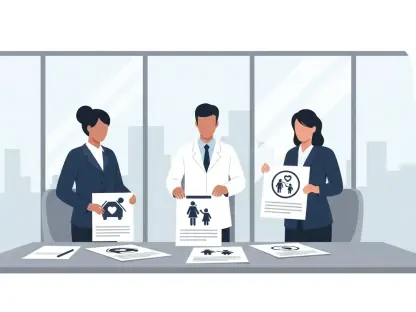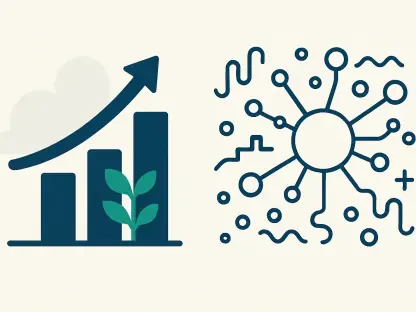Setting the Stage for a Digital Insurance Shift
Imagine an insurance landscape where manual processes and weeks-long delays are relics of the past, replaced by instantaneous risk assessments and seamless transactions. This vision is rapidly becoming reality as the insurance technology sector undergoes a profound transformation. The recent acquisition of Cytora, an AI-driven risk processing platform, by Applied Systems, a titan in insurance software solutions, marks a pivotal moment for the industry. This market analysis delves into the implications of this strategic partnership, exploring how it reshapes operational efficiencies, drives digital integration, and positions stakeholders for a competitive edge. By examining current trends and future projections, the goal is to uncover the broader impact on insurers, brokers, and managing general agents (MGAs) navigating an increasingly digital marketplace.
Deep Dive into Market Trends and Projections
AI as the Backbone of Insurance Efficiency
The insurance market has long grappled with inefficiencies stemming from labor-intensive tasks like risk evaluation and policy processing. Applied Systems’ integration of Cytora’s AI technology is set to disrupt these pain points by automating data handling across diverse formats, from structured ACORD forms to unstructured emails and PDFs. Carriers leveraging similar AI tools have already reported slashing time-to-quote from weeks to mere hours, a trend that suggests significant cost reductions and enhanced focus on high-value risks. Market data indicates that AI adoption in insurance workflows could reduce operational expenses by up to 30% over the next few years, with scalability being a key driver. However, challenges such as data privacy concerns and the integration of AI into legacy systems remain critical hurdles that must be addressed to sustain this momentum.
Connectivity Across the Insurance Value Chain
Beyond efficiency, the partnership between Applied Systems and Cytora signals a shift toward a more interconnected insurance ecosystem. By merging robust software platforms with cutting-edge risk digitization, this alliance aims to bridge gaps between agencies, carriers, and other stakeholders. The concept of a “Digital Roundtrip of Insurance” envisions a fully automated policy lifecycle, minimizing errors and accelerating communication. Comparative analysis with other sectors, such as e-commerce, highlights how seamless integration can drive exponential growth in transaction volumes. Yet, uneven technology adoption across regions and potential over-reliance on digital tools pose risks that could slow progress. Market projections suggest that integrated platforms could dominate the industry by 2027, provided training and change management strategies are prioritized.
Global Expansion and Market Nuances
The ambition to scale Cytora’s AI capabilities globally introduces both opportunities and complexities to the insurance market. Applied Systems plans to tailor these solutions to diverse regulatory environments and business lines, addressing unique challenges in regions like Europe with stringent data protection laws compared to North America. Emerging markets stand to benefit from real-time risk assessment, potentially disrupting traditional models and increasing insurance penetration. However, cultural resistance to automation and varying levels of technological readiness could temper adoption rates. Industry forecasts indicate that global AI-driven insurance platforms might capture a significant market share within the next five years, but success hinges on customizing approaches to local needs and overcoming structural barriers.
Future Trajectories: Automation and Beyond
Looking ahead, the collaboration between Applied Systems and Cytora underscores broader market trends toward automation, predictive analytics, and personalized policy offerings. Machine learning advancements are expected to enable real-time data processing, transforming how insurers assess and price risks. Regulatory shifts, particularly around data usage, may impose constraints, while economic pressures could accelerate the adoption of cost-saving technologies. Projections suggest that by the end of this decade, up to 80% of routine insurance tasks could be handled by AI, reshaping workforce dynamics and operational models. This partnership may also catalyze a wave of consolidation in the insurtech space, as competitors seek to build comprehensive, end-to-end solutions to stay relevant in a rapidly evolving landscape.
Reflecting on a Transformative Milestone
Looking back, the acquisition of Cytora by Applied Systems stood as a landmark event that redefined the insurance technology market. It highlighted the immense potential of AI to streamline workflows, foster connectivity, and unlock global opportunities. For stakeholders, the strategic takeaway was clear: investing in digital tools and training became essential to maintain a competitive edge. Insurers and brokers were encouraged to pilot AI solutions in high-impact areas like underwriting, while prioritizing data security to build client trust. Monitoring regulatory developments also emerged as a critical step to ensure compliance. Moving forward, the industry was poised to benefit from continued collaboration with tech providers, paving the way for an era of innovation where efficiency and responsiveness became the cornerstones of success.









